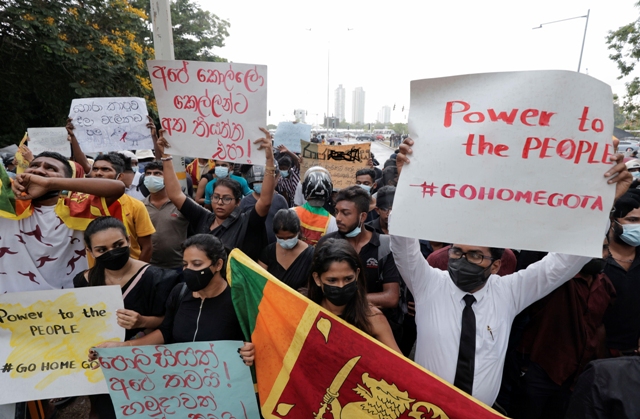 5 April: People hold placards demanding Sri Lanka's President Gotabaya Rajapaksa on a road leading to the parliament building in Colombo. [Reuters/Alamy stock photo]
5 April: People hold placards demanding Sri Lanka's President Gotabaya Rajapaksa on a road leading to the parliament building in Colombo. [Reuters/Alamy stock photo]
[This is an excerpt from an article in The Round Table: The Commonwealth Journal of International Affairs.]
Sri Lankans across ethno-religious lines are, for the first time in living memory, collectively rebuking the status quo and more specifically the nepotist governing philosophy of the country. In defiance of the Rajapaksa regime’s extra-legal curfews, social media bans and police actions, many are speaking out against the systemic – mainly economic – injustices that are being forced upon the citizenry. While the dissatisfaction is palpable, it is this narrow pocketbook-oriented grievance that must give rise to subdued hope and caution now that the Rajapaksas have been shown the door. The same shades of vitriol and parochialism which have debilitated the nation since independence are still evident at the protests, the core of which comprises the Sinhala Buddhist majority.
If the protests are to lead to meaningful political change it is important to shed light upon the prejudices that led to the enthronement of the Rajapaksas in the first place, for it is only by putting these biases front and centre that any attempt at finding the truth may be made.
Gota gone: Sri Lankans depose Rajapaksas – but how much will change?
Opinion: Sri Lanka, one-time Asia’s role model becomes a bankrupt nation
‘Go home, Gota’: Sri Lanka unites against the Rajapaksas
The first malady, ironically, has been the sense of Sinhalese victimhood, which in turn led to the very real victimisation of the country’s minorities. Spurred on by the British divide-and-rule tactics embodied through the Mudaliar System, colonial rulers used the prevailing prejudices of the island’s people against one another. This included arbitrarily elevating select Christian converts to the top of the island’s social hierarchy and bestowing lands and titles on them which were critical for the creation of vernacular elites. This sense of victimhood reached its zenith with the passage of the Sinhala Only Act in 1956 ensuring the calamitous history the island has been exposed to ever since.
Merely ushering the Rajapaksas out of power is unlikely to prevent their return – for reasons similar to those which applied to the Marcos family in the Philippines – because they would use a combination of their presumed ill-gotten gains and the continued susceptibility of the population to clientelism to ensure a comeback. It is almost a given that the myth-building efforts around the Rajapaksas, which started no sooner than the Civil War came to its bloody end in 2009, will sustain the authoritarian nostalgia. Evidence of this can be found in the rabble of die-hard supporters who continue to stage counter-protests and in the overwhelming manner in which local political representatives have coalesced around the first family.
Secondly, accompanying this victimhood and feeding this grievance since before independence to the very pinnacle of absurdity has been the false deference to Buddhist monks. While the Buddhist canon covering both the Suthra and Vinayak Pitakaya advises the non-engagement of monks in secular politics, the immense power that the Sanga (clergy body) holds over the average Buddhist’s material and immaterial concerns has enabled the order to run roughshod over the constraints of the nation’s institutions.
From the archives: Transforming conflict with an economic dividend: The Sri Lankan experience
Introduction to a 2019 special edition on Sri Lanka
The third prong is the blight of parochialism, which in the present case takes a specifically geographic form. The most prominent chants from the protests have centred around police and military brutality, extra-legal corrupt behaviour on the part of the state, politicians’ self-dealing, and – most widely – pocketbook issues. Until now areas dominated by the Sinhalese were spared the strong-arm tactics of the state; however, the minorities of the North and East had no such luck: they have had to deal with the constant coercion that an AK-47 rifle brings to any conversation of ‘equals’. While many who actively worked in the human rights and anti-corruption space have cautioned the public for decades against the excesses of the Rajapaksas, the warnings were lost on the majority and I would suspect this to be still the case.
Even if dismissing the Rajapaksas has been realised, at least for the time being, preventing an avatar of the Rajapaksas from coming to future national prominence, given the Sinhalese zeitgeist will be a herculean task.
Kavinda Ratnapala is a rreelance writer in Colombo, Sri Lanka.



